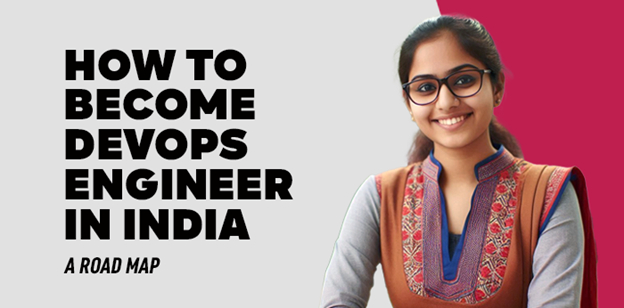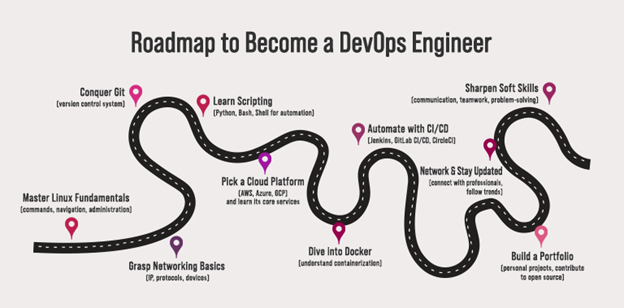
The role of a DevOps engineer has rapidly gained prominence in India’s IT landscape. As organizations increasingly adopt agile methodologies and cloud technologies, the demand for professionals who can bridge the gap between development and operations is soaring.This arite up focuses onDevOps engineer career path,DevOps certification IndiaSkills for DevOps engineer,DevOps engineer salary India,DevOps courses online.This article outlines a roadmap to becoming a successful DevOps engineer in India.
Join 100% Online Degree programs UGC Entitled and Affordable
TheDevOps engineer career path typically starts with a foundational understanding of software development and IT operations. A bachelor’s degree in computer science, information technology, or a related field provides a strong base. However, many successful DevOps engineers have transitioned from roles like software developer, system administrator, or network engineer.The given below is a Road Map to Devops Engineer for a successful career
The career progression often involves moving from a DevOps engineer to a senior DevOps engineer, then to a DevOps architect or team lead. With further experience and specialization, one can ascend to DevOps manager or director positions.The table given below clarifies the career progression of a Devops Engineer or more precisely Devops engineer career path.
|
Role |
Responsibilities |
|
DevOps Engineer |
Implements and automates DevOps practices, tools, and processes; collaborates with development and operations teams. |
|
Senior DevOps Engineer |
Leads DevOps initiatives, mentors junior engineers, and provides technical guidance. |
|
DevOps Architect |
Designs and implements DevOps strategies and architectures aligned with business objectives. |
|
DevOps Team Lead |
Manages DevOps teams, sets priorities, and ensures alignment with organizational goals. |
|
DevOps Manager/Director |
Oversees DevOps operations, drives DevOps adoption, and reports to senior management. |
The given below is a Road Map to Devops Engineer for a successful career.

Road Map To DevOps Engineer
DevOps certification India while not mandatory, certifications can enhance your credibility and job prospects. Some popular DevOps certification India includes:
The given below is a table with devops certification in india in a nutshell
|
Certification |
Provider |
Focus |
|
Certified Kubernetes Administrator (CKA) |
Cloud Native Computing Foundation (CNCF) |
Kubernetes cluster administration and operations |
|
Certified Kubernetes Application Developer (CKAD) |
Cloud Native Computing Foundation (CNCF) |
Designing, building, configuring, and deploying cloud-native applications |
|
Certified DevOps Practitioner (CDP) |
DevOps Institute |
Entire DevOps lifecycle, from planning to deployment and operations |
|
Amazon Web Services (AWS) Certified DevOps Engineer – Professional |
Amazon Web Services (AWS) |
Implementing and operating complex DevOps solutions on AWS |
|
Microsoft Certified: DevOps Engineer Expert |
Microsoft |
Designing and implementing DevOps solutions on Microsoft Azure |
A successful DevOps engineer possesses a blend of technical and soft skills.Given Below are the main Skills for DevOps engineer.
Technical Skills:
The salary of a DevOps engineer in India varies based on factors such as experience, skills, location, and company size. On average, a DevOps engineer can expect a salary range of INR 6-20 lakhs per annum. However, experienced professionals with specialized skills can earn significantly higher salaries.
This is the table with Devops Engineer salary India which is taken from glassdoor website.the salary given is annual salary with respect to the level of jobs undertsaken,ranging from entry level o mid level and to senior level.
|
Experience Level |
Average Salary (INR Lakhs per annum) |
|
Entry-level (0-2 years) |
₹ 3.5 – 6 lakhs per year |
|
Mid-level (2-5 years) |
₹ 5 – 8 lakhs per year |
|
Senior-level (5+ years) |
₹ 8 – 14 lakhs per year |
Numerous online platforms offer DevOps courses catering to different learning styles and budgets. Some popular options include:
Additional Tips:
By following these steps and consistently honing your skills, you can successfully embark on a rewarding career as a DevOps engineer in India.
Remember: While certifications and courses provide a solid foundation, practical experience and a deep understanding of DevOps principles are crucial for long-term success.
A strong narrative can transform your portfolio from a mere collection of projects into a compelling story that resonates with potential employers. Here’s how to create one:
Identify Your Core Competencies
Start by pinpointing your strongest DevOps skills. This could be:
Choose a Theme or Focus
Decide on a central theme for your portfolio. This could be:
Develop a Storyline
Create a narrative that connects your projects. This could be:
Use Storytelling Techniques
Engage your audience with storytelling elements:
Tailor Your Narrative to the Audience
Adapt your story based on the specific job you’re applying for:
Example Narratives:
By crafting a compelling narrative, you can differentiate yourself from other candidates and showcase your value as a DevOps engineer.
Becoming a DevOps engineer in India is a rewarding career path that demands a blend of technical proficiency, problem-solving skills, and a collaborative mindset. By understanding the DevOps lifecycle, acquiring essential skills, and building a strong portfolio, you can position yourself for success in this dynamic field.Remember, the DevOps landscape is constantly evolving, so continuous learning is essential. Stay updated with the latest trends, technologies, and best practices.